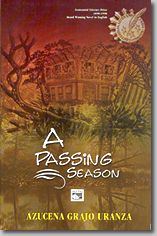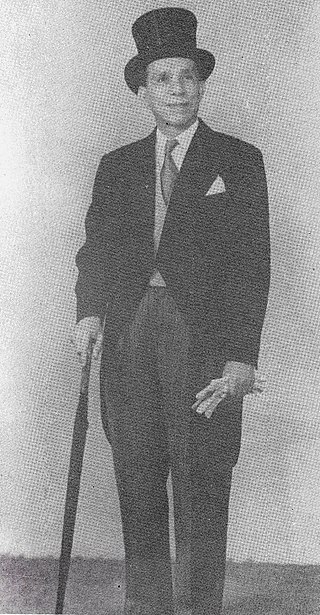
The University of the Philippines is a state university system in the Philippines. It is the country's national university, as mandated by Republic Act No. 9500, giving it institutional autonomy.
Philippine literature is literature associated with the Philippines from prehistory, through its colonial legacies, and on to the present.

The Philippine Collegian is the official weekly student publication of the University of the Philippines Diliman. It is also commonly known to the university's students as Kulê. It is known for its radical, national democratic, often anti-administration views, and gives critical views on the policies of the UP administration and the Philippine government.
Philippine literature in English has its roots in the efforts of the United States, then engaged in a war with Filipino nationalist forces at the end of the 19th century. By 1901, public education was institutionalized in the Philippines, with English serving as the medium of instruction. That year, around 600 educators in the S.S. Thomas were tasked to replace the soldiers who had been serving as the first teachers. Outside the academe, the wide availability of reading materials, such as books and newspapers in English, helped Filipinos assimilate the language quickly. Today, 78.53% of the population can understand or speak English.

Cecilia Manguerra Brainard is an author and editor of 20 books. She co-founded PAWWA or Philippine American Women Writers and Artists; and also founded Philippine American Literary House. Brainard's works include the World War II novel, When the Rainbow Goddess Wept, The Newspaper Widow, Magdalena, and Woman With Horns and Other Stories. She edited several anthologies including Fiction by Filipinos in America, Contemporary Fiction by Filipinos in America, and two volumes of Growing Up Filipino I and II, books used by educators.
José Wendell Capili is a Filipino academic and writer. He earned degrees from the University of Santo Tomas, University of the Philippines Diliman, University of Cambridge and Australian National University. He is a Professor of creative writing and comparative literature at the College of Arts and Letters, University of the Philippines. His creative and scholarly works were published in Asia, Europe, North America and Australia.
Azucena Grajo Uranza is a Filipino novelist, short story writer, and playwright in the English language.

Jose Y. Dalisay Jr. is a Filipino writer. He has won numerous awards and prizes for fiction, poetry, drama, non-fiction and screenwriting, including 16 Palanca Awards.
Epifanio San Juan Jr., also known as E. San Juan Jr., is a known Filipino American literary academic, Tagalog writer, Filipino poet, civic intellectual, activist, writer, essayist, video/film maker, editor, and poet whose works related to the Filipino Diaspora in English and Filipino writings have been translated into German, Russian, French, Italian, and Chinese. As an author of books on race and cultural studies, he was a "major influence on the academic world". He was the director of the Philippines Cultural Studies Center in Storrs, Connecticut in the United States. In 1999, San Juan received the Centennial Award for Achievement in Literature from the Cultural Center of the Philippines because of his contributions to Filipino and Filipino American Studies.

The University of the Philippines College of Law is the law school of the University of the Philippines Diliman. Formally established in 1911 in UP Manila, it is the third oldest continually-operating law school in the Philippines. Since 1948, it has been based in UP Diliman in Quezon City, the flagship of the UP System's eight constituent universities. The college also holds extension classes at the Bonifacio Global City campus of UP Diliman in Taguig and the Iloilo City campus of UP Visayas.

Lope K. Santos was a Filipino Tagalog-language writer and former senator of the Philippines. He is best known for his 1906 socialist novel, Banaag at Sikat and for his contributions to the development of Filipino grammar and Tagalog orthography.
Ligaya G. Tiamson-Rubin, is a Filipino writer. A multiple Carlos Palanca Memorial Awards for Literature recipient, and currently a professor of the University of the Philippines Diliman. Today, she is teaching Filipino 25, Mga Ideya at Estilo under the Department of Filipino and Philippine Literature at the College of Arts and Letters, University of the Philippines Diliman in Diliman, Quezon City.

Louie Mar Gangcuangco is a Filipino physician, HIV researcher and novelist. He is the author of the novel Orosa-Nakpil, Malate and is working as Assistant Professor of Medicine for the Hawaii Center for AIDS-University of Hawai'i at Manoa.

A Passing Season is a 2002 award-winning historical novel written by Filipino author Azucena Grajo Uranza. It won third prize during the 1998 Philippine Centennial Literary Awards, an event commemorating the First Philippine Republic of 1898. Chronologically, A Passing Season is followed by Uranza’s Bamboo in the Wind.
Danton Relato Remoto is a Filipino writer, essayist, reporter, editor, columnist, and professor. Remoto received the first prize at the ASEAN Letter-Writing Contest for Young People. The award earned Remoto a scholarship at the Ateneo de Manila University in the Philippines. As a professor, Remoto taught English and Journalism at the Ateneo de Manila University. Remoto is the chairman emeritus of Ang Ladlad, a lesbian, gay, bisexual, and transgender (LGBT) political party in the Philippines.

José Emeterio Muñoz Romero Sr., commonly known as José E. Romero, was a statesman and diplomat from the Philippines. He represented Negros Oriental's Second District and was Majority Floor Leader during the Ninth and Tenth Philippine Legislatures and the First and Second National Assemblies of the Philippines. He was senator-elect of the First Congress of the Philippines and later became the first Philippine ambassador to the United Kingdom and Secretary of Education.
Soledad Sarmiento Reyes is a Philippine literature scholar, literary and art critic, author, anthologist, consultant, professor, instructor, editor, annotator, researcher, and essayist in the Philippines. Specializing in the field of popular culture and the arts in the Philippines, Reyes is a professor teaching interdisciplinary studies at the University of the Philippines and the Ateneo de Manila University. She is an accomplished author of books and anthologies. "sa nobela mababalatuba ang mga pangyayati sa buhay ng isang kagawad sa union

My Sad Republic is a 2000 Philippine English-language novel written by Filipino novelist Eric Gamalinda. The novel won for Gamalinda a Philippine Centennial Literary Prize in 1998. The 392-page novel was published by the Philippine Centennial Commission, the University of the Philippines Press, and the UP Creative Writing Center. My Sad Republic is the fourth novel written by Gamalinda. The theme of the novel is "love, obsession, and loss" occurring during the Philippine Revolution against the Spanish colonial regime of the Philippines, and during the Philippine–American War.
Gardeopatra Gador Quijano was a Filipino Visayan dentist, teacher, writer, and fiction author known for her novel, Lourdes, which is regarded as the first feminist novel written in the Cebuano language. She is considered the first Cebuana feminist fiction writer and was awarded the Gawad CCP para sa Sining in 1993.










